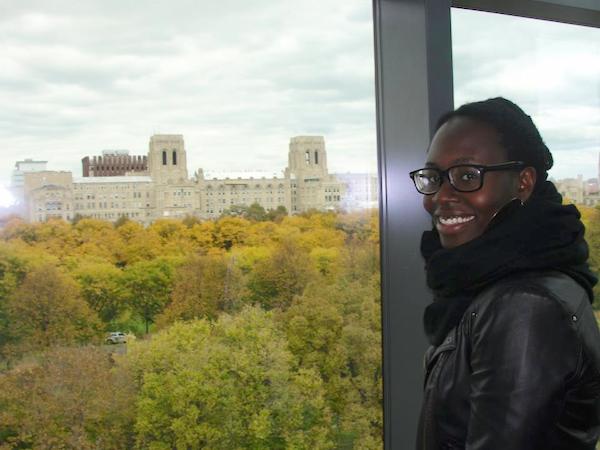
Once in a great while, someone truly special makes a difference. We can't all be Wonder Woman, but our words, actions, and conduct have the power to enact great changes in our world. Anthonia Akitunde is one such individual. As founder of the powerful and beautiful blog, mater mea, Akitunde seeks to empower women from all walks of life, and break stereotypes about black women. Though the site just celebrated its third birthday, mater mea certainly has a meaningful future awaiting. We couldn't wait to catch up with Akitunde, and contemplate her perspectives on the exclusivity of the feminist movement, goals, and the multi-faceted nature of women.
1. Can you explain your initial inspiration behind mater mea? Has that changed over time? If so, how?
mater mea was created in 2012 at the height of conversations about “leaning in” and “can women have it all?” I was in my late 20s, and felt invested in these questions. How do you have the career that you’ve worked for, and the family that you want as well? All the thinkpieces I read at the time focused on white women who were close to the very top of their respective career ladders. What did it look like for women of color who were mid-career or entrepreneurs? And who are these women? I knew they existed, but they weren’t being represented in a way that I could relate to or as a leading woman of her own story. The site launched Mother’s Day of 2012 as a bimonthly online magazine with longform profiles of different women around the New York area who were from all walks of life, careers, and socioeconomic backgrounds. It has since expanded to include women from all over the world, as well as different categories to become a platform for black women to share their stories around career and motherhood.
Also, I'm not a mom, but I was really invested in hearing answers to the questions I had about work-life balance that didn't feel too pat or "la la la, just have a lot a lot of money." So, starting the site was a way for me to get real answers to those questions from women who look like me and whom I admire.
2. From Yegna (an all girl's Ethiopian music group) to Michelle Obama, you definitely know how to spot inspiring women! What other ladies do you consider role models?
Now is a great time to be a black woman creator. There are many platforms that democratize expression; if you have a unique point of view and the wherewithal to express it, you’re going to have an audience who will share. It’ll land in front of me, and I’ll think, “Yes!”
Issa Rae; Kimberly Foster of For Harriet; Alicia Garza, Patrisse Cullors, and Opal Tometi, the women who started the Black Lives Matter movement; the moms and women we’ve featured on the site . . . there are so many I could list.
3. What is the best piece of advice you have ever received? Why?
It’s hard to follow, but not to judge your progress by another person’s watch. It’s really easy to get caught up in vanity metrics like another website's likes and follower numbers, but then I'll get an email or a comment from someone telling me just how much mater mea means to them. That keeps me moving.
Also, saying what you want and putting it out there in the universe. You never know how things will conspire to give you what you need — or a version that you didn’t know you needed until it was presented.
4. The current feminist movement has received criticism for excluding women of color. In what ways can the feminist movement be more inclusive?
Acknowledge that intersectionality exists, and being a woman doesn’t mean being a white woman only. There are issues that affect women of different races, sexualities, and gender expressions differently. While white women do make less than men, women of color make even less: black women make 64 cents and Latinas make 56 cents for every dollar made by a white male. These women also deal with systemic racism (or immigration issues) that lowers their access to salaried jobs. But that’s not the headline in the feminist movement.
When the feminist movement treats white women’s experiences and concerns as the default, it can become as problematic as the patriarchy.
5. mater mea's topics cover a wide array of women's needs (beauty, career, serious interviews, to name a few). Why do you choose to incorporate this range? Do you have a "favorite" section?
Women have those multitudes. These women are career savvy, they have a family, they’re sharing their beauty secrets and how they stay grounded. My favorite section would have to be the features and the personal essays. It’s great to channel a woman’s story and share it with an audience who doesn’t see themselves reflected in mainstream media. The stories are so powerful and comforting — you feel like you’re not alone.

6. mater mea also contains noticeably beautiful photography. Dorothea Lange once said, "Photography takes an instant out of time, altering life by holding it still." How does this concept play into your use of photography on the site?
I’m really lucky to work with incredibly talented photographers and writers on the site. Our first photographer, J. Quazi King, set the tone for the quality we want in the photos. We want to spin the notion of black women — what their homes and lives looks like — on its head. When you Google search the phrase "black moms are" a lot of terrible stereotypes pop up, such as "black moms are abusive" and "black moms are the worst." The photos on mater mea are saying that's not true, that's not the entire picture. By presenting these beautiful and intimate photos, we’re affirming what we already know: our stories are compelling and worth documenting in a thoughtful, professional way.
7. What are the three biggest issues, in your opinion, that women of color face presently in the US? How about globally?
I can’t speak for all women of color, and I can’t speak for global issues because there are many different communities that I’m not a part of. From my experience as a black woman in the United States, I would say systemic racism is the biggest issue. There are so many forces that are trying to bring us down or invalidate our lives and experiences, but all strings and players lead back to systemic racism.
8. What are your future goals for mater mea, and yourself in general?
I really want mater mea to be a self-sustaining media platform that presents the wholeness, fullness, and diversity of women of color’s lives. I want it to be something that continues to showcase the work and talent of writers, photographers, and creators of color. Right now, it’s a labor of love and self-funded; it would be great for it to be a labor of love that generated enough revenue to support all the great people who contribute to it! I’m working on that — I’ll be working on the site full-time this August.
I would also like to feel more confident in calling myself an entrepreneur. I’ve been a writer for years, and was very mercenary about that — if you pay me, I’ll write about anything. I never would have said I was business-minded or wanted to work for myself. I’m coming into my own, and I hope that this process only helps me expand my abilities and perceptions about what I can do.
9. What books are currently on your nightstand?
I’m getting back into reading books again — I was a huge reader when I was younger, but now there never seems to be enough time. I’m trying to make time and remove myself from the information overload I feel when I’m trying to keep up with zeitgeist-y articles and podcasts. I just finished reading Judy Blume’s new book which was a quick and fun read. I’m reading Jesmyn Ward’s Men We Reaped, which is part memoir, part excoriation of the systems that played a role in the deaths of her brother and three close friends. My boyfriend and I are reading A Game of Thrones — obsessed with the show, and the book is just as fantastic as all those spoiler-y commenters online have been saying.






![By Magicland9 [CC BY-SA 3.0 (https://creativecommons.org/licenses/by-sa/3.0)], from Wikimedia Commons By Magicland9 [CC BY-SA 3.0 (https://creativecommons.org/licenses/by-sa/3.0)], from Wikimedia Commons](/sites/default/files/styles/profile/public/images/article/2019-06/Bell.png?itok=gWp6s_Y0)